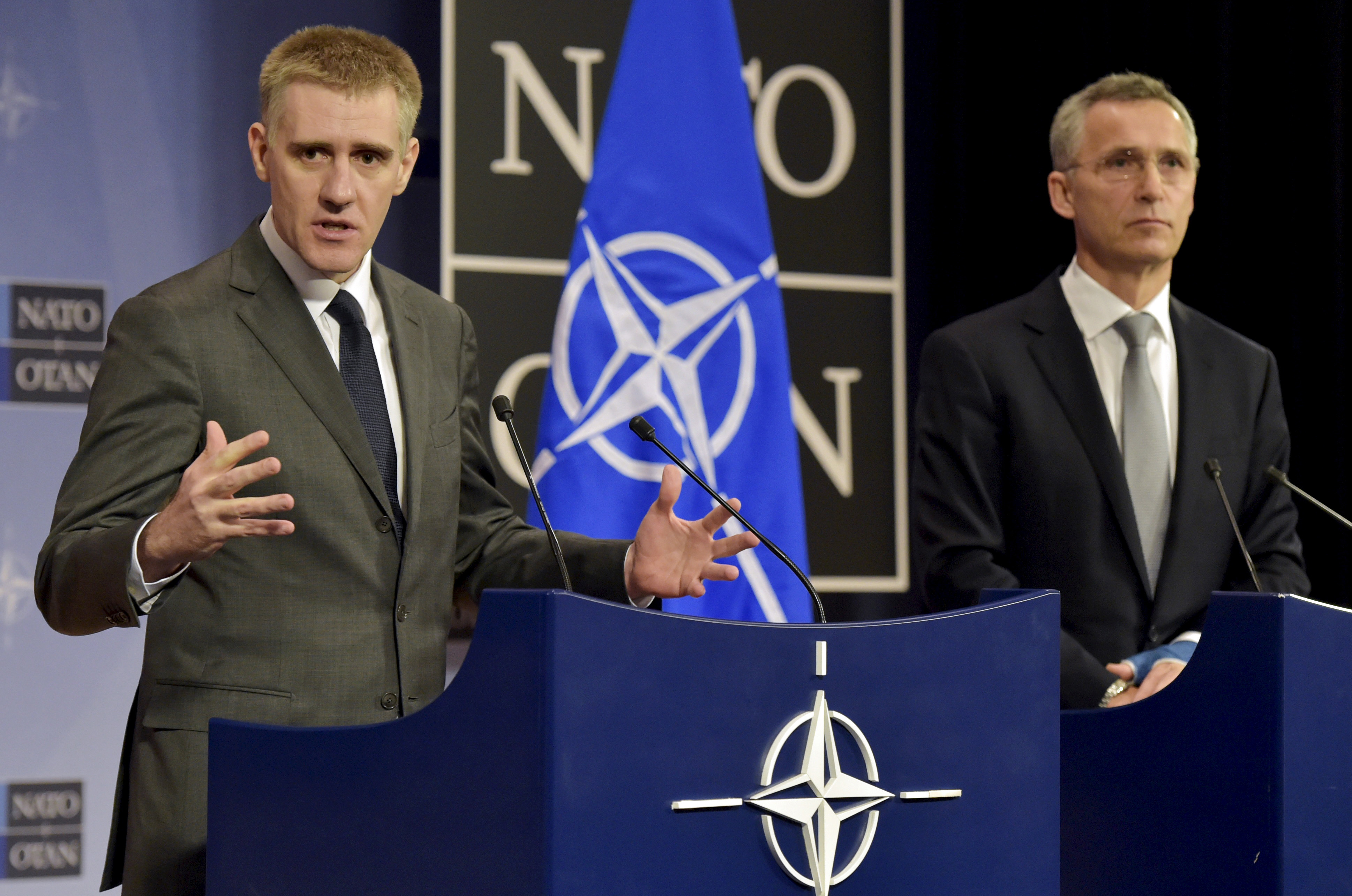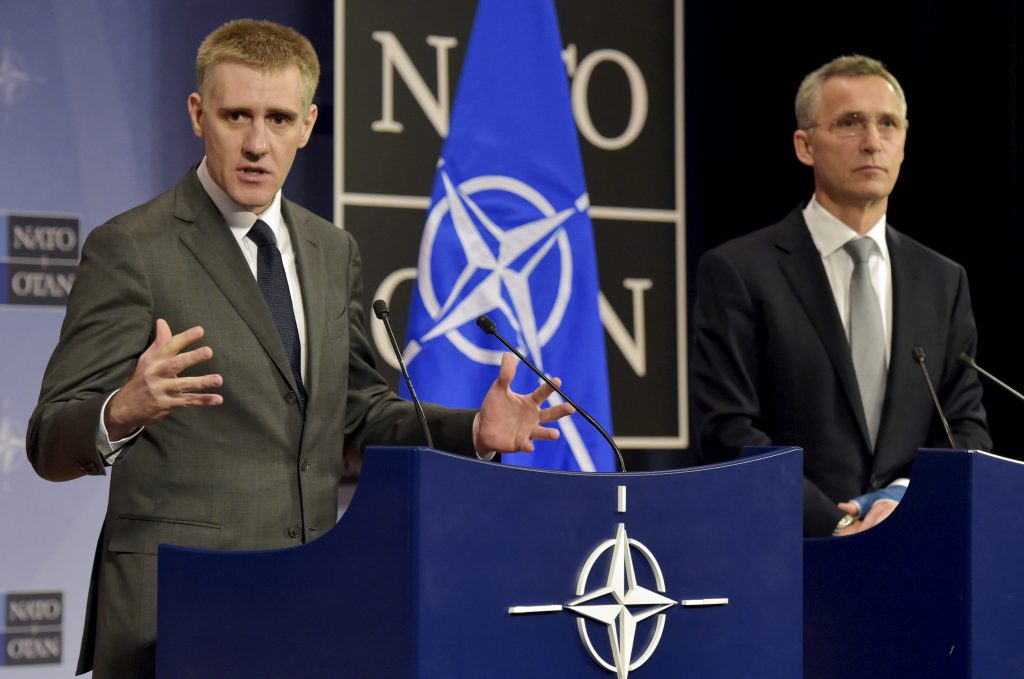
Atlantic Council’s Damon Wilson says decision puts NATO on a ‘safer path forward for security and stability’
NATO’s invitation to Montenegro to join the military alliance — its first expansion since 2009 — is the right decision, has significant implications, and is an important response to Russia’s actions in Eastern Europe, said Damon Wilson, Executive Vice President of the Atlantic Council.
“I think it is an important part of our response to Russia’s misbehavior in the east — taking this strategic and correct decision in the south,” Wilson said in an interview with the New Atlanticist.
Russia expectedly criticized NATO’s invitation and has vowed to freeze joint projects with Montenegro.
US Secretary of State John Kerry said the decision to invite Montenegro was not directed at Russia.
Damon Wilson, a former US National Security Council and NATO official who has worked on NATO enlargement since 1999,spoke in an interview with the New Atlanticist’s Ashish Kumar Sen. Here are excerpts from our interview.
Q: Why is NATO’s invitation to Montenegro significant?
Wilson: Montenegro is ready. It has been going through a pretty wrenching process of reforms internally, addressing difficult issues related to rule of law. It has been acting as an ally, as you can see from what it has been doing in Afghanistan. And it is also clear from its political leadership that they have taken a strategic decision to be in Europe and to be part of the transatlantic community. Montenegro is the only country in the Western Balkans that actually has managed to have good relations with all of its neighbors and no conflicts. The story of Montenegro stands, that it is able and willing to contribute to Alliance security.
The invitation from NATO is significant far beyond the reaches of this small little country nestled in the Western Balkans for a couple of reasons.
First, it is an important signal for the Western Balkans that there is a possibility of advancing their integration agenda with both NATO and the European Union, where there have been doubts, setbacks, and challenges. This is an important step forward and a signal to the region that if they take some of the tough decisions, they will find a home in our institutions.
Second, it is quite important for the Alliance itself because you don’t enlarge if you don’t have a sense of confidence in your institution. The enlargement decision is important for NATO’s self-confidence.
Third, it is a really important statement to Russia that we will not be intimidated by bullying and that we will not back down from something that is right because of, frankly, irresponsible rhetoric from Moscow. This is the first time in the enlargement process, especially in the Western Balkans, where Moscow has staked a position saying that further enlargement is provocative. This is a reversal from Moscow’s approach to Macedonia, Croatia, and Albania.
I think this invitation is an important part of our response to Russia’s misbehavior in the east — taking this strategic and correct decision in the south.
Q: What are the practical implications of Montenegro’s entry into NATO?
Wilson: Montenegro will now have a seat at the table of the world’s most successful alliance. It is now part of the conversations on transatlantic security. It has a voice there but it also will have — when it joins — a sense of responsibility and become a stakeholder in the set of principles and the security that the Alliance is upholding.
Practically, there will be opportunities for greater integration into NATO, its integrated military command, participation in NATO exercises and operations. But it also practically means a pretty significant name brand stamp of approval that we have seen in the past has been quite an important boost for investor confidence. So even though the alliance is not directly related to the economic story, it should be catalytic to providing a sense that the country is on a path to the right direction where Western investments can be more safe.
Q: Russia views this invitation as a provocation. Why is Moscow wrong in its assumption?
Wilson: The idea of a country taking a decision about its own future being provocative is an illustration of an incredible mindset. It is a mindset that you have some right of veto over other sovereign countries’ decisions about the direction of their own destiny. What this is is expected bullying, expected rhetoric that originally was meant to intimidate, to try to create and sow divisions inside Montenegro. We have seen Russian hands on the protests in the run-up to this decision, both financing and organization. It was also intended to intimidate the allies into not doing this.
Moscow is wrong in this supposition because if we live in a world where countries aren’t able to help shape and take decisions about their own future it will lead to an unraveling of the international order, and we see that happening in Europe’s east already because of Moscow’s actions. The last thing we want to see is an extension of that into the Western Balkans.
Q: How do you expect Russia will respond to Montenegro’s NATO membership?
Wilson: I think this is a lot of bluster. Moscow, when faced with decisive action and solidarity, will typically either back down or work around. The danger we were running was that if the Alliance had blinked in the face of Russian bullying tactics, then Moscow would have been encouraged to move beyond some of the mischief making to actually play a game with higher stakes. So I think we have actually moved on a safer path forward for security and stability because there is a predictable outcome — Montenegro joins the Alliance. It is anchored inside the Alliance and is not a vulnerable soft spot for Moscow to play games with.
Q: What implications will the invitation to Montenegro have for countries like Georgia?
Wilson: The decision today was an important signal that the open door remains credible and viable. It is important to remember that the open door is a permanent part of NATO policy built into Article 10 of the Washington Treaty, but today’s decision signals that politically it remains viable and is in play. That is a good signal for Macedonia, Georgia, Bosnia, and for others that may come — Sweden, Finland, and even Cyprus.
For Georgia, this shows that the Alliance has the ability and the will to continue the process of enlargement, but it does underscore the hard work that Georgia faces because of geography.
Georgia’s military is far more integrated and has been far more involved in NATO operations — just look at Afghanistan today. And yet there remains ambivalence and uncertainty because of geography, because the Russian occupation of large chunks of its territory.
I actually think that the invitation to Montenegro is a positive signal for other aspirants, but it means that there is still substantial work to be done on the political side of the equation to convince allies that further enlargement, particularly to Georgia, is going to contribute to alliance security. There is no doubt that Georgia can carry the burdens of the responsibility of membership.
Ashish Kumar Sen is a staff writer at the Atlantic Council.
Image: NATO Secretary General Jens Stoltenberg (right) holds a news conference with Montenegro’s Foreign Minister, Igor Luksic, after a NATO Foreign Ministers’ meeting at the Alliance’s headquarters in Brussels, Belgium, on Dec. 2. (Reuters/Eric Vidal)
